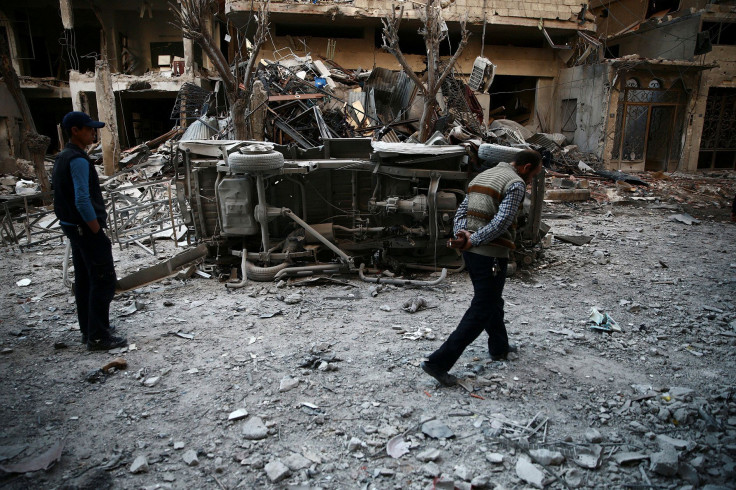Syria Chemicals In Attack Not Targeted By US Airstrikes At Air Force Base

The U.S. military's airstrikes that attacked an air force base in Syria last week did not aim to destroy the very chemical weapons that led to the bombings, a branch of the U.S. Department of Defense announced Monday. Syrian government military forces launched a chemical attack against civilians there, killing dozens of people, including children.
While President Donald Trump cited the chemical attack as the primary reason behind the military response from the U.S. that included 59 Tomahawk missiles, it was unclear why American forces "did not target chemical weapons storages," a spokesman for the United States Central Command (Centcom) said via Twitter.
Read: Market Reacts To Airstrikes On Syria
.@CENTCOM Spox: We targeted fuel reserves, aircraft, and did not target chemical weapons storages #Syria (3/3)
— U.S. Central Command (@CENTCOM) April 10, 2017
"On Tuesday, Syrian dictator Bashar al-Assad launched a horrible chemical weapons attack on innocent civilians," Trump told the nation Thursday night. "Using a deadly nerve agent, Assad choked out the lives of helpless men, women and children. It was a slow and brutal death for so many. Even beautiful babies were cruelly murdered in this very barbaric attack."
Instead, Centcom said, the U.S. "targeted fuel reserves" and "aircraft," presumably because that location was the air force base from where planes took off before dropping what was suspected to be sarin, a deadly nerve gas, above the city of Idlib last Thursday.
"It was not our intention to make the #Syria Shayrat Airfield inoperable," the Centcom spokesperson tweeted. Instead, "It was our intention to degrade Syrian's capability to perform chemical attacks."
Most people in the U.S. were in favor of the airstrikes, according to a new poll released Monday morning. Nearly 60 percent of all Americans were in favor if the surprise military action, according to a CBS News survey. In contrast, 36 percent of Americans were against the airstrikes.
Russia agreed to rid Syria of its chemical weapons back in 2013, but that deal between the U.S. and Russia obviously never fully materialized. While both Former Secretary of State John Kerry and former national security adviser Susan Rice had both said publicly that Syria voluntarily surrendered its chemical weapons, that also clearly never happened.
The reasons for this?
"There are two possibilities," former Assistant Secretary of Defense for Nuclear, Chemical and Biological Defense Programs and senior fellow at Harvard Kennedy School’s Belfer Center for Science and International Affairs, Andy Weber, told CBS News Monday. "One is that they held back a couple barrels of the sarin component, or — and I don’t know which of these two possibilities is what happened — but the second possibility is they had the people and the experts."
© Copyright IBTimes 2025. All rights reserved.






















